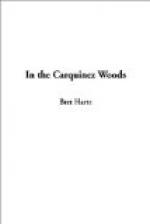She had saved a quarrel between them at the sacrifice of herself, for her vanity was still keen enough to feel that this exhibition of her old weakness had degraded her in their eyes, and, worse, had lost the respect her late restraint had won from Low. They had treated her like a child or a crazy woman, perhaps even now were exchanging criticisms upon her—perhaps pitying her! Yet she had prevented a quarrel, a fight; possibly the death of either one or the other of these men who despised her, for none better knew than she the trivial beginning and desperate end of these encounters. Would they—would Low ever realize it, and forgive her? Her small, dark hands went up to her eyes and she sank upon the ground. She looked through tear-veiled lashes upon the mute and giant witnesses of her deceit and passion, and tried to draw, from their immovable calm, strength and consolation as before. But even they seemed to stand apart, reserved and forbidding.
When Low returned she hoped to gather from his eyes and manner what had passed between him and her former lover. But beyond a mere gentle abstraction at times he retained his usual calm. She was at last forced to allude to it herself with simulated recklessness.
“I suppose I didn’t get a very good character from my last place?” she said, with a laugh.
“I don’t understand you,” he replied, in evident sincerity.
She bit her lip and was silent. But as they were returning home, she said gently, “I hope you were not angry with me for the lie I told when I spoke of ‘your plan.’ I could not give the real reason for not returning with—with—that man. But it’s not all a lie. I have a plan—if you haven’t. When you are ready to go to Sacramento to take your place, dress me as an Indian boy, paint my face, and let me go with you. You can leave me—there—you know.”
“It’s not a bad idea,” he responded gravely. “We will see.”
On the next day, and the next, the rencontre seemed to be forgotten. The herbarium was already filled with rare specimens. Teresa had even overcome her feminine repugnance to “bugs” and creeping things so far as to assist in his entomological collection. He had drawn from a sacred cache in the hollow of a tree the few worn text-books from which he had studied.
“They seem very precious,” she said, with a smile.
“Very,” he replied gravely. “There was one with plates that the ants ate up, and it will be six months before I can afford to buy another.”
Teresa glanced hurriedly over his well-worn buckskin suit, at his calico shirt with its pattern almost obliterated by countless washings, and became thoughtful.
“I suppose you couldn’t buy one at Indian Spring?” she said innocently.
For once Low was startled out of his phlegm. “Indian Spring!” he ejaculated; “perhaps not even in San Francisco. These came from the States.”
“How did you get them?” persisted Teresa.




